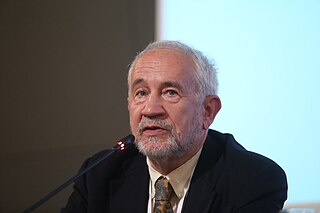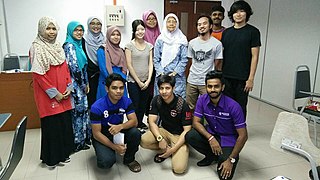Related Research Articles

Seyyed Hossein Nasr is an Iranian philosopher and University Professor of Islamic studies at George Washington University.
Iranian philosophy or Persian philosophy can be traced back as far as to Old Iranian philosophical traditions and thoughts which originated in ancient Indo-Iranian roots and were considerably influenced by Zarathustra's teachings. According to the Oxford Dictionary of Philosophy, the chronology of the subject and science of philosophy starts with the Indo-Iranians, dating this event to 1500 BC. The Oxford dictionary also states, "Zarathustra's philosophy entered to influence Western tradition through Judaism, and therefore on Middle Platonism."

Sachiko Murata is Japanese scholar of comparative philosophy and mysticism and a professor of religion and Asian studies at Stony Brook University. She is a 2011 Guggenheim Fellow.
History of Islamic Philosophy, first published in 1996 with, is a collection of essays by various authorities on Islam in the Routledge series History of World Philosophies and is edited by Seyyed Hossein Nasr of George Washington University and Oliver Leaman of Liverpool John Moores University. The book has been well reviewed.

Joseph E.B. Lumbard is an American Muslim scholar of Islamic studies and associate professor of Quranic studies at the College of Islamic Studies at Hamad Bin Khalifa University in Qatar. He is the author, editor, and translator of several scholarly books and many articles on Islamic philosophy, Sufism, and Quranic studies.
M. Ali Lakhani, is a writer, lawyer, and editor whose works focus on metaphysics and the perennial principles found in the wisdom traditions of the world.

James Winston Morris is an American Islamic theologian, currently a professor in the Department of Theology at Boston College. Before teaching at Boston College, he held the Sharjah Chair of Islamic Studies at the University of Exeter.

Gholamreza Aavani is an Iranian philosopher and emeritus professor of philosophy at Shahid Beheshti University in Tehran. A former head of the Institute for Research in Philosophy, Aavani is a member of the Academy of Sciences of Iran and a steering committee Member of the International Federation of Philosophical Societies. He has also served as the Kenan Rifai Distinguished Professor of Islamic Studies at Beijing University, China.

Osman Bakar is an emeritus professor of philosophy at the University of Malaya, the Chair Professor and Director of Sultan Omar Ali Saifuddien Centre for Islamic Studies (SOASCIS), Universiti Brunei Darussalam and an Islamic philosopher. He is a fellow at the Center for Civilisational Dialogue in the University of Malaya and Doshisha University in Japan and a former President of the Islamic Academy of Sciences of Malaysia. He was the recipient of the honorary title "Dato" by the Sultan of Pahang in 1994 and "Datuk" by the King of Malaysia in 2000, and was Included in the list of 500 most influential Muslims in the world several times.

Zailan Moris is a Malaysian scholar of Islamic philosophy and former professor of the School of Humanities at the University Sains Malaysia. Her main interests are Islamic philosophy, comparative religion and Sufism.
Waleed El-Ansary is an Egyptian-American scholar of comparative religion, Islam and Islamic economics and the Helal, Hisham and Laila Edris El-Swedey University Chair in Islamic studies at Xavier University in Cincinnati, Ohio.
In traditionalist philosophy, desacralization of knowledge or secularization of knowledge is the process of separation of knowledge from its divine source—God or the Ultimate Reality. The process marks a paradigmatic shift in understanding of the concept of knowledge in the modern period. It has rejected divine revelations as well as the idea of spiritual and metaphysical foundations of knowledge, confining knowledge to empirical data and reason alone. Although it is a recurrent theme among the writers of the Traditionalist school that began with René Guénon, a French mystic and intellectual who earlier spoke of "the limitation of knowledge to its lowest order", the process of desacralization of knowledge was most notably surveyed, chronicled and conceptualized by the Iranian philosopher Seyyed Hossein Nasr in his 1981 Gifford Lectures that were later published as Knowledge and the Sacred.
Caner Dagli is a Circassian-American Islamic scholar and associate professor of Religious Studies at the College of the Holy Cross in Worcester, Massachusetts.
In perennial philosophy, scientia sacra or sacred science is a form of sacred knowledge that lies at the heart of both divine revelations and traditional sciences. It recognizes sources of knowledge other than those recognized by modern epistemology, such as divine revelations and intellectual intuition, the latter of which is considered a supra-rational form of knowledge based on the human intellect. Scientia sacra embodies principles and doctrines derived from reason, revelation and intellectual intuition, with the conviction that these sources of knowledge can be reconciled without conflict in a hierarchical order and employed in the human quest to understand different orders of reality. It views the universe as a unified reality centered on God—the Ultimate Reality—whose knowledge is beyond the reach of sense perception and reason. This notion may be traced back to traditional cultures and civilizations, particularly Islamic tradition, which was primarily conceptualized in contemporary language by the Iranian philosopher Seyyed Hossein Nasr in his book Knowledge and the Sacred, originally published in 1981, containing his Gifford Lectures delivered that same year.
In perennial philosophy, tradition means divinely ordained truths or principles revealed or unveiled to mankind, and refers to their implications and applications in different areas of human life and thought. Traditionalists employ the term to refer to immutable principles—the sophia perennis or primordial wisdom—that are rooted in the Divine Center, as opposed to the term "modern," or "modernity," which is divorced and disconnected from the reality of God or the Absolute Truth. The term "tradition" is also used synonymously with revelation, and it encompasses all forms of philosophy, art, and culture that are influenced by it. Although the term has been used in relation to perennial philosophy since René Guénon, and was further developed by his adherents, including Ananda Coomaraswamy and Frithjof Schuon, it was most notably conceptualized by the Iranian philosopher Seyyed Hossein Nasr, who credited Guénon for his idea of tradition.
In traditionalist philosophy, pontifical man is a divine representative who serves as a bridge between heaven and earth. Promethean man, on the other hand, sees himself as an earthly being who has rebelled against God and has no knowledge of his origins or purposes. This concept was notably developed in contemporary language by the Iranian philosopher Seyyed Hossein Nasr.
Resacralization of nature is a term used in environmental philosophy to describe the process of restoring the sacred quality of nature. The primary assumption is that nature has a sanctified aspect that has been lost in modern times as a result of the secularization of contemporary worldviews. These secular worldviews are said to be directly responsible for the spiritual crisis in "modern man", which has ultimately resulted in the current environmental degradation. This perspective emphasizes the significance of changing human perceptions of nature through the incorporation of various religious principles and values that connect nature with the divine. The Iranian philosopher Seyyed Hossein Nasr first conceptualized the theme of resacralization of nature in contemporary language, which was later expounded upon by a number of theologians and philosophers including Alister McGrath, Sallie McFague and Rosemary Radford Ruether.
In traditionalist philosophy, resacralization of knowledge is the reverse of the process of secularization of knowledge. The central premise is that knowledge is intimately connected to its divine source—God or the Ultimate Reality—which has been severed in modern times. The process of resacralization of knowledge seeks to reinstate the role of intellect above and beyond that of reason, as well as to revive the role of traditional metaphysics in acquiring knowledge—especially knowledge of God—by drawing on sacred traditions and sacred science that uphold divine revelations and the spiritual or gnostic teachings of all revealed religions. Iranian philosopher Seyyed Hossein Nasr elaborated on the process of resacralization of knowledge in his book Knowledge and the Sacred, which was presented as Gifford Lectures in 1981.
Islamic Philosophy from its Origin to the Present: Philosophy in the Land of Prophecy is a book by Seyyed Hossein Nasr, Iranian philosopher and University Professor of Islamic studies at George Washington University, including a comprehensive overview of Islamic philosophy from the 9th century to the present day.
In Search of the Sacred: A Conversation with Seyyed Hossein Nasr on His Life and Thought is a 2010 book about the life and thought of the Iranian philosopher Seyyed Hossein Nasr.
References
- ↑ Markwith 2010, pp. 103–116.
- ↑ Mrahorovic 2012, pp. 409–410.